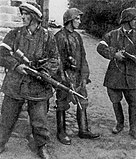Tadeusz Bór-Komorowski
General Count Tadeusz Komorowski | |
|---|---|
  | |
| Nickname(s) | "Bór" |
| Born | 1 June 1895 Khorobriv, Kingdom of Galicia and Lodomeria |
| Died | 24 August 1966 (aged 71) London, United Kingdom |
| Rank | General (dywizji) |
| Battles/wars | Great War Polish–Bolshevik War Polish Defensive War Operation Tempest Warsaw Uprising World War II |
| Awards | |
| Other work | politician, writer |
General Count Tadeusz Komorowski (Korczak coat of arms) (1 June 1895 – 24 August 1966), better known by the name Bór-Komorowski (after one of his wartime code-names: Bór – "The Forest") was a Polish military leader.[1] He was appointed commander in chief a day before the capitulation of the Warsaw Uprising and following World War II, Prime Minister of the Polish government-in-exile in London.[2]
Life
Komorowski was born in Khorobriv, in the Kingdom of Galicia and Lodomeria (the Austrian partition of Poland). In the First World War he served as an officer in the Austro-Hungarian Army, and after the war became an officer in the Polish Army, rising to command the Grudziądz Cavalry School.
After taking part in the fighting against the German invasion of Poland at the beginning of World War II in 1939, Komorowski, with the code-name Bór, helped organize the Polish underground in the Kraków area. In July 1941 he became deputy commander of the Home Army (Armia Krajowa or "AK"), and in March 1943 gained appointment as its commander, with the rank of Brigadier-General.[1]
The Uprising
| Part of a series on the |
| Polish Underground State |
|---|
 |
In mid 1944, as Soviet forces advanced into central Poland, the Polish government-in-exile in London instructed Bór-Komorowski to prepare for an armed uprising in Warsaw. The government-in-exile wished to return to a capital city liberated by Poles not seized by the Soviets and prevent the Communist take-over of Poland which Stalin had clearly set in train.[3]
The Warsaw Uprising began on Komorowski's order on 1 August 1944 and the insurgents of the AK seized control of most of central Warsaw. Elements of the Soviet Army stood only 20 km (12 mi) away but on Joseph Stalin's orders gave no assistance: Stalin described the rising as a "criminal adventure" [citation needed]. The British managed to drop some supplies by air but could give no direct assistance. The Germans employed large forces of Waffen-SS and regular troops, plus auxiliary forces made up of Soviet Army deserters, who acted particularly brutally, under the command of Erich von dem Bach.[3]
In September 1944, Bór-Komorowski was promoted to General Inspector of the Armed Forces (Polish Commander-in-Chief).[1]
Aftermath
After two months of fierce fighting Bór-Komorowski surrendered to the Germans on 2 October, on condition that Germany treat the AK fighters as prisoners-of-war, which they did. Bór-Komorowski went into internment in Germany (at Oflag IV-C). Despite pressure from Germans, he refused to issue orders of surrender to Home Army units in German controlled Poland who continued fighting.[3] Liberated at the end of the war, he spent the rest of his life in London, where he played an active role in Polish émigré circles. From 1947 to 1949 he served as Prime Minister of the Polish government-in-exile, which no longer had diplomatic recognition from most Western European countries. He wrote the story of his experiences in The Secret Army (1950). After the war he was an upholsterer. He died in London aged 71.[2] After his death in London on Aug. 24, 1966, he was buried in Gunnersbury Cemetery (also known as (New) Kensington Cemetery). On July 30, 1994 Gen. Bor-Komorowski's ashed were buried in Powązki Military Cemetery in Warsaw.[4]
Honours and awards
- Order of the White Eagle (posthumously, 1995)
- Commander's Cross of the Order of Virtuti Militari (previously awarded the Knight's Cross, the Gold Cross and the Silver Cross)
- Grand Cross of the Order of Polonia Restituta (previously awarded the Officer's Cross)
- Cross of Valour – three times
- Gold Cross of Merit with Swords
- Gold Cross of Merit
- Silver Cross of Merit
- Honorary citizen of Glowno (posthumously, 2004)
See also
References
- ^ a b c Mariusz Podgórski, Mikołaj Falkowski (26 February 2009). "Tadeusz Bór-Komorowski". Historia. Polskie Radio. Retrieved 2 December 2013.
- ^ a b Andrzej Paczkowski (2003). The Spring Will Be Ours: Poland and the Poles from Occupation to Freedom. Penn State Press. p. 196. ISBN 0271047534.
- ^ a b c Piotr M. Majewski, 63 Dni walki o Warszawę (63 days of fight for Warsaw) Mowiawieki.pl (Internet Archive)
- ^ "POLISH HERO'S ASHES FINALLY BURIED IN HOMELAND". Associated Press. July 31, 1994.
External links
- A film clip "Longines Chronoscope with Tadeusz Bór-Komorowski" (November 2, 1951) is available for viewing at the Internet Archive
- 1895 births
- 1966 deaths
- People from Kozova Raion
- People from the Kingdom of Galicia and Lodomeria
- Counts of Poland
- Prime Ministers of Poland
- Polish generals
- Armia Krajowa members
- Rada Trzech
- Polish Austro-Hungarians
- Polish people of World War I
- Austro-Hungarian military personnel of World War I
- Warsaw Uprising insurgents
- Polish people of the Polish–Soviet War
- Olympic equestrians of Poland
- Equestrians at the 1924 Summer Olympics
- Male equestrians
- Polish emigrants to the United Kingdom
- Commanders of the Virtuti Militari
- Grand Crosses of the Order of Polonia Restituta
- Recipients of the Cross of Valour (Poland)
- Recipients of the Cross of Merit with Swords (Poland)
- Recipients of the Gold Cross of Merit (Poland)
- Recipients of the Silver Cross of Merit (Poland)
- Komorowski family
- Lviv Polytechnic alumni
- Polish anti-communists
- Colditz prisoners of World War II
